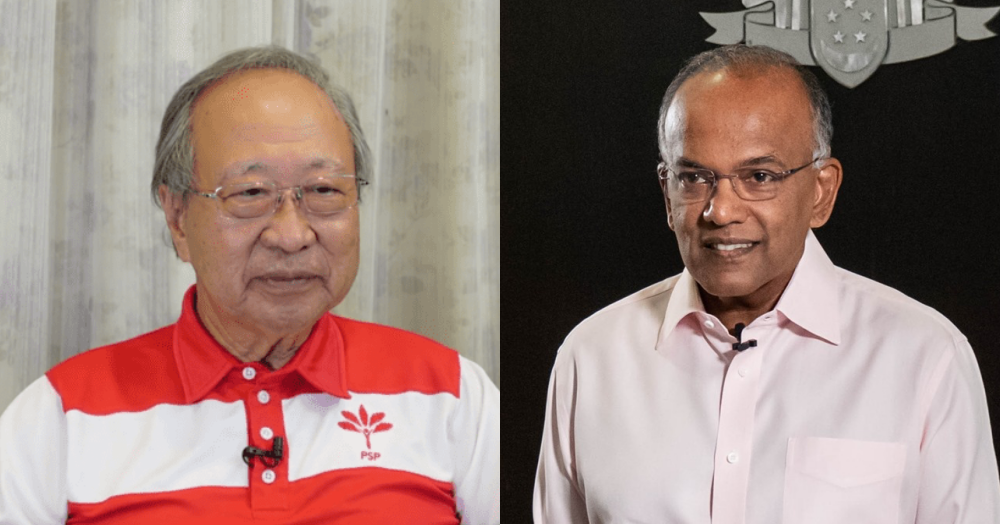Follow us on Telegram for the latest updates: https://t.me/mothershipsg
Progress Singapore Party (PSP) Chairman Tan Cheng Bock expressed his concern today (Sep. 25) over the urgency at which the proposed Foreign Interference Countermeasures Bill is being passed through in Parliament.
Addressing Singaporeans in a five and a half minute YouTube video, Tan said that the second reading of the bill, which is due for Oct. 4, "should not proceed until a comprehensive review of the bill has been carried out".
Tan also questioned the speech of the legislation:
"What is the hurry for such a lengthy piece of legislation to be brought through Parliament and pass as law in 3 weeks?"
The bill was first introduced by the Ministry of Home Affairs (MHA) on Sep. 13.
If passed, it would give the Minister for Home Affairs powers to investigate and counter hostile information campaigns, by issuing directives to various entities such as social media services, or people who own or run websites, blogs or social media pages.
The legislation also aims to create greater transparency in political donations.
PSP: "We fully support non-interference"
Despite Tan's apprehension towards the bill, he stressed that PSP fully supports non-interference into Singapore's domestic affairs.
He added: "[Non-interference] is the basis for international peace and cooperation between countries. [...] And safeguarding ourselves from undue foreign interference is prudent."
However, Tan said that although the title of the bill makes the law seem "reasonable", the bill "has much more than the title suggests".
Bill has "far more reaching power and latitude to prosecute" than POFMA
Tan highlighted that the bill is extensive in that in covers many definitions of "Politically Significant Persons" or entities, as well as various rules governing political donations, requirements for operating online sites and directives that affect various stakeholders.
He finds the bill "significant" as it gives extensive powers to ministers in their execution of the bill.
If passed, the legislation would give only the Minister for Home Affairs the power to take down content deemed to be part of a hostile information campaign
Tan expressed concern over potential abuses of power:
"Such power can lead to abuses especially when many areas are vaguely defined and decisions are left to the discretion of ministers who could simply act based on suspicion."
He added that the Foreign Interference Countermeasures Bill will give the government "far more reaching power and latitude to prosecute than the POFMA bill."
The Protection from Online Falsehoods and Manipulations Act (POFMA) was passed in parliament in 2019, and gives ministers the power to issue a Correction direction on false statements of fact that are against public interest.
Not enough time to study impact and implications of bill
Tan said that urgency at which the bill is being pushed through is "troubling", when considering that there are "much more urgent matters" like the current pandemic that the country should focus on instead.
Noting that the second and third readings of bills often occur on the same day, Tan pointed out that the bill would have only been considered in Parliament for three weeks since it was first introduced on Sep. 13.
The voting of a bill typically occurs on the same day as the second and third readings in Parliament as well.
He added: "there simply isn’t enough time for all MPs (Members of Parliament) to thoroughly study and understand the impact and implications of the bill to meaningfully participate in any robust deliberations."
Questioned if bill had other purposes
Tan emphasised that such a bill, which will impact "all political parties and citizens" who share their views in the public domain, should require public consultation and greater scrutiny by a Select Committee before the bill is introduced in parliament.
He contrasted the government's treatment of the Foreign Interference Countermeasures Bill to that of POFMA, which is "a much shorter piece of legislation", but had undergone the process of public consultation and a review by a Select Committee.
"This bill surely cannot be less far reaching than POFMA," he added.
Tan then questioned whether the intentions of the bill were genuine:
"Is it to really prevent foreign interference? Or is it a means to stifle freedom of expression, alternative views and political discourse in the name of foreign interference."
Tan said it would be "irresponsible" of the government to pass the bill in just weeks without a "thorough public hearing".
Follow and listen to our podcast here
Top photos via PSP website and K Shanmugam/Facebook
If you like what you read, follow us on Facebook, Instagram, Twitter and Telegram to get the latest updates.
